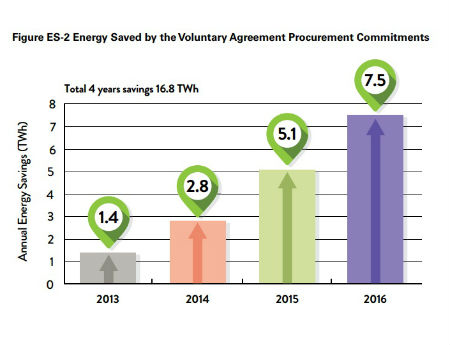Study: Voluntary Set-Top Energy Deal Has Saved $2.1B So Far
The smarter way to stay on top of the multichannel video marketplace. Sign up below.
You are now subscribed
Your newsletter sign-up was successful

A voluntary set-top box energy conservation agreement that’s supported by the pay-TV industry, consumer electronics manufactures and other advocates have saved $2.1 billion and 11.8 million metric tons of carbon dioxide over the past four years, a report shows.
The report, from independent auditor D+R International and distributed Wednesday by the Consumer Technology Association and the NCTA – The Internet & Television Association, found that consumers saved about $941 million in energy costs in 2016 alone.
The carbon dioxide savings is equal to removing 2.5 million cards from the road for a year, the report found.
RELATED: Pay-TV Firms, CEA, Energy Agree On Set-Top Standards
The voluntary agreement aimed at boosting the energy efficiency of set-tops as signed in 2012. Signatories include MVPDs such as AT&T/DirecTV, Comcast, Charter Communications, Verizon, Dish Network, Cox Communications and CenturyLink as well as box makers that include Arris, Technicolor and EchoStar Technologies, and energy efficiency advocates (Natural Resources Defense Council, American Council for an Energy-Efficient Economy, and the Appliance Standards Awareness Project (ASAP). CableLabs has also contributed by researching and developing energy efficiency strategies.
D+R estimated that nearly three-fourths of all DVRs in the field today were purchased under the voluntary agreement’s energy standards, and that new DVR models now use an average of 40% less energy than those bought prior to the agreement. Service providers are also upgrading devices to support reduced power modes during periods of inactivity.
Among set-tops purchased between 2013 to 2016, the weighted average of energy consumption for DVRs is down 40%, non-DVRs are down 28%, thin-client boxes are down 48%, and DTAs (digital transport adapters) are down 28%.
The smarter way to stay on top of the multichannel video marketplace. Sign up below.
The initial term of the Voluntary Agreement is set to expire at the end of this year, but the parties recently issued a joint statement that there are talks underway and optimism that there will be a consensus to extend the terms for several more years.
Per the latest annual audit, 98.6% of all new set-tops meet Energy Star efficiency standards, and that signatories pledge to support higher energy efficient standards that became effective Jan. 1, 2017 for 90% of their purchases this year.
